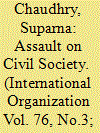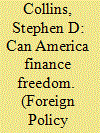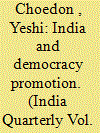|
|
|
Sort Order |
|
|
|
Items / Page
|
|
|
|
|
|
|
| Srl | Item |
| 1 |
ID:
186592


|
|
|
|
|
| Summary/Abstract |
Nongovernmental organizations are central to contemporary global governance, and their numbers and influence have grown dramatically since the middle of the twentieth century. However, in the last three decades more than 130 states have repressed these groups, suggesting that a broad range of states perceive them as costly. When they choose to repress NGOs, under what conditions do states use violent strategies versus administrative means? The choice depends on two main factors: the nature of the threat posed by these groups, and the consequences of cracking down on them. Violent crackdown is useful in the face of immediate domestic threats, such as protests. However, violence may increase the state's criminal liability, reduce its legitimacy, violate human rights treaties, and further intensify mobilization against the regime. Therefore, states are more likely to use administrative crackdown, especially in dealing with long-term threats, such as when NGOs influence electoral politics. I test this theory using an original data set of administrative crackdowns on NGOs, as well as violent crackdown on NGO activists, across all countries from 1990 to 2013. To shed light on the strategic decision between violent or administrative crackdown, and how states may perceive threats from domestic and international NGOs differently, I provide a case study from India. I conclude by discussing the implications of this crackdown for the use of civil society actors by the international community, as well as donors and citizens in the global South.
|
|
|
|
|
|
|
|
|
|
|
|
|
|
|
|
| 2 |
ID:
091486


|
|
|
|
|
| Publication |
2009.
|
| Summary/Abstract |
Recent discourse on U.S. efforts to promote democracy has focused on military activities; especially the strategic and normative perils of democracy promotion at the point of bayonets. This paper explores the United States' use of economic statecraft to foster democratization, with particular attention to democracy incentive and assistance strategies. Incentive approaches attempt to promote democracy from the top-down, by leveraging aid and trade privileges to persuade authoritarian leaders to implement political reform. Assistance approaches aim to induce democratization from the inside, through funding and technical assistance to state institutions, and from the bottom-up, by providing support to civil society and elections. This study finds that while top-down incentive approaches can stimulate democratic change, this strategy tends to work only when aid and trade benefits are conditional; that is, when benefits are withheld until recipient states meet rigorous democratic benchmarks. Washington has historically eschewed democratic conditionality, however, and thus can claim very few aid-induced or trade-induced democratization events. Scant evidence exists to demonstrate that inside approaches-that is, institutional aid-possesses significant capacity to induce democracy. It is the bottom-up approach-empowering the masses to compel democratic change-that has registered the greatest number of democracy promotion successes.
|
|
|
|
|
|
|
|
|
|
|
|
|
|
|
|
| 3 |
ID:
174723


|
|
|
|
|
| Summary/Abstract |
A growing literature identifies both situations where aid promotes peace and those where aid encourages violence. Specifically, research shows lower probability of conflict onset in democratizing states receiving high levels of democracy assistance. However, theorizing has overlooked important actors who have agency in spending such aid: civil society organizations (CSOs). We posit that the status of civil society within recipient states conditions the effect of democracy aid inflows on conflict probability. Using an instrumental variables approach to account for endogeneity between aid allocation and conflict propensity, we find that democracy aid is destabilizing when directed to environments where CSOs are weak and poorly connected to the regime and thus are less willing and able to seek change through peaceful means. When civil society is stronger and more institutionalized, however, larger democracy aid flows pose less threat.
|
|
|
|
|
|
|
|
|
|
|
|
|
|
|
|
| 4 |
ID:
138866


|
|
|
|
|
| Summary/Abstract |
When the Western countries confronted backlash in their promotion of democracy, they wooed India to join them. India has shown reluctance to join them due to various factors. It starts with discussion of how it was inconceivable for India to promote democracy during the Cold War and then examine factors that made India reticent to commit itself to democracy promotion in the post-Cold War. The paper discusses the reasons as to why a nuanced shift towards supporting democracy promotion has taken place in the turn of the Century and how this shift is made with the intention of making a difference through participation rather than openly protesting and standing aloof on principle ground. The main focus of the paper is to highlight how India provides democracy assistance differently from that of the Western countries and what kind of tangible assistances India provided to those who sought. It highlights how, keeping in view the sensitivity of sovereignty among the developing countries, India uses term such as ‘democracy assistance’ or ‘democracy support’ instead of ‘democracy promotion’ and how it adopts policy of providing democracy assistance only when requested and it follows top-down approach, dealing mainly with the sovereign states and their institutions. It ends with an emphasis on the value addition of having diverse approaches to spreading democracy.
|
|
|
|
|
|
|
|
|
|
|
|
|
|
|
|
| 5 |
ID:
167668


|
|
|
|
|
| Summary/Abstract |
As noted by other contributions to this special issue, an American perspective shapes many leading quantitative datasets used by international relations scholars. This tendency can lead to biased inferences, but it can also enhance scholarly accuracy under certain conditions. Precisely because some datasets reflect national perspectives, they are appropriate to use when seeking to test theories in which the actors of interest subscribe to the same national perspective. This argument is illustrated with the case of US democracy assistance. Using an appropriate measure of democracy reveals that—contrary to some claims in the literature—US policy-makers allocate democracy assistance in ways that reflect their perceptions of countries’ regime types, giving less democracy assistance to countries that they perceive as more democratic.
|
|
|
|
|
|
|
|
|
|
|
|
|
|
|
|
| 6 |
ID:
165876


|
|
|
|
|
| Summary/Abstract |
This exploratory article seeks to analyze the nature and impact of one of the main democracy promoters in Malaysia i.e. the United States (US). The US is a promoter that is often being alleged with interfering with Malaysian domestic affairs, especially since the sacking of former Deputy Prime Minister, Anwar Ibrahim in 1998. This article argues that the US democracy promotion in Malaysia can be conceptualized under the framework of a concurrent democracy assistance strategy. This is due to the fact that while the US is supporting the non-regime compatible program, it is also concurrently channeling bigger aid for regime-compatible program to Malaysia from 1999–2015. The improvement of diplomatic ties between both countries since post-Mahathir era and the prioritization of security issues have led to a more engaging conduct of democracy promotion. Despite the US continuous funding of non-regime-compatible programs through non-state actors, this approach was nevertheless balanced by cordial relations at the state level. Nevertheless, the effect of US democracy assistance and promotion on Malaysia’s democratic development has been minimal, reinforcing the views on the difficulty to promote democracy in a semi-authoritarian regime.
|
|
|
|
|
|
|
|
|
|
|
|
|
|
|
|
|
|
|
|
|